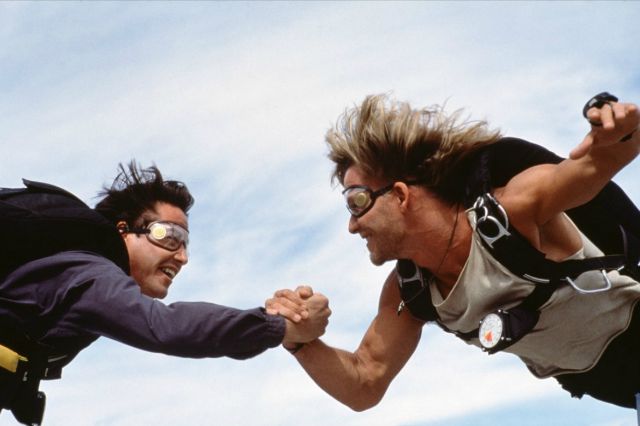Why You Should Love 'Point Break' And Hate 'The Breakfast Club'
By Joel Wicklund in Arts & Entertainment on Sep 22, 2015 9:05PM

“Point Break” (© 1991 Twentieth Century Fox)
This weekend, two much-loved films from the mid-'80s and early '90s will play for late-night movie fans. The Logan Theatre will show The Breakfast Club (1985), John Hughes' "Brat Pack" comedy/drama, while the Music Box will show Kathryn Bigelow's action favorite, Point Break (1991), just a couple of months ahead of a wholly unnecessary remake.
These are, of course, radically different movies and have endured for very different reasons. The Breakfast Club continues to speak to teens grappling with cliques and peer pressure, while triggering nostalgia for older generations who found the same quality in the film when they saw it. Point Break holds up for its astonishing action sequences, with additional cult appeal for its dumb-but-fun plotting and homoerotic subtext.
But when you peel each movie down to its essence, both are about people trying to find freedom in a system established to keep them cogs in a wheel. In The Breakfast Club, the system is high school clique divisions, and Hughes has a character to broadly represent these groups: the princess, the jock, the troublemaker, the geek, and the presumed weirdo. In Point Break, the system is ... well, the system: society itself, as bank-robbing surfer guru Bodhi (Patrick Swayze) makes crystal clear in a cheerleading speech to his tribe.
Both movies have their merits and their faults. I'm not a fan of most of Hughes' work, but in The Breakfast Club the northern suburbs' favorite son crafted some sharp dialogue for his cinematic teen therapy session. For me, Point Break has a real depth of feeling underneath its over-the-top qualities. But it certainly has its dopey moments, as well as one of Keanu Reeves' most wooden performances...which is really saying something. (Swayze's always earnest over-emoting helps balance things out.)
It's fair to say, though, that The Breakfast Club is now seen almost universally as a classic, while Point Break is viewed largely as something of a camp item (as evidenced by a popular live stage parody). There are dozens of arguments as to why these reputations should be reversed. Kathryn Bigelow is by far the more interesting director and whatever dated qualities Point Break has, they aren't as cringe-inducing as the video-styled dance montage in The Breakfast Club.
But that's a matter of personal taste. Let's cut to the chase of why you should love Point Break and hate The Breakfast Club. Point Break truly wants you to be free, but knows it's ultimately impossible. The Breakfast Club wants you to think you are free, but actually fully endorses conformity. For those who haven't seen these decades-old movies, be warned there are plot spoilers ahead.
The Breakfast Club is seemingly all about breaking social boundaries, as the archetypal teens stuck in an all-day Saturday detention get to know each other, argue, reveal their family burdens and insecurities, and share a good cry or two. But what really happens at the end of all this catharsis?
"Weirdo" Allison (Ally Sheedy), while obviously in need of a good dandruff shampoo, has a perfectly cool, dark and artsy look going on. But that's not going to fly for Hughes' yearbook-ready demands, so spoiled rich girl Claire (Molly Ringwald) transforms her into a dainty girly-girl, perfectly suitable for jock Andrew (Emilio Estevez). So much for individuality. Geeky and smart Brian (Anthony Michael Hall) is pressured into writing the required essay for the rest of the group, maintaining his status as high school footstool. So much for social equality.
Sure, you can argue the budding romance between troublemaker Bender (Judd Nelson) and Claire topples the high school norms ... but not really. The upper class girl dating the bad boy? It's a teen drama queen staple. And the outcast who scores with the goody two-shoes type? Bragging rights among his peers for sure! And Hughes pretty much lets that social model stand when Claire doesn't argue after Bender suggests, "You know how you said before, how your parents used you to get back at each other? Wouldn't I be outstanding in that capacity?"
And finally, in the movie's two-girls-and-three guys dynamic, it is naturally Brian the geek who ends up with no hint of future romance. Yep, things pretty much fall into place for high school as usual at the end of The Breakfast Club. And yet, as Bender raises his fist in triumph, Simple Minds' anthemic "Don't You Forget About Me" plays, and the credits roll with spirits high.
Everything falls into place at the end of Point Break too, but the vibe is decidedly more downbeat. The rebellious freedom of the bank-robbing surfers has turned deadly, as most serious rebellions do. The "bromance" (whether read as straight or gay) between Bodhi and Johnny Utah has fallen with the bodies, but more significantly, it has fallen to their inescapable roles.
Even though he tosses his badge away at the end of the movie, a la Dirty Harry, Johnny doesn't do it until he closes the door permanently on Bodhi's quest for freedom. In a gesture to the lost dream, he agrees not to arrest Bodhi and let him surf one last big wave. But both men know the truth...he won't survive this last wave. Death is the only real escape from the rules.
Ultimately, for all the thrills of Point Break and all the high spirits on display in The Breakfast Club, both movies deliver the same grim message: You will take your place in the order of things. The difference is Point Break tells it like it is, while The Breakfast Club gets you to fall for the big lie.